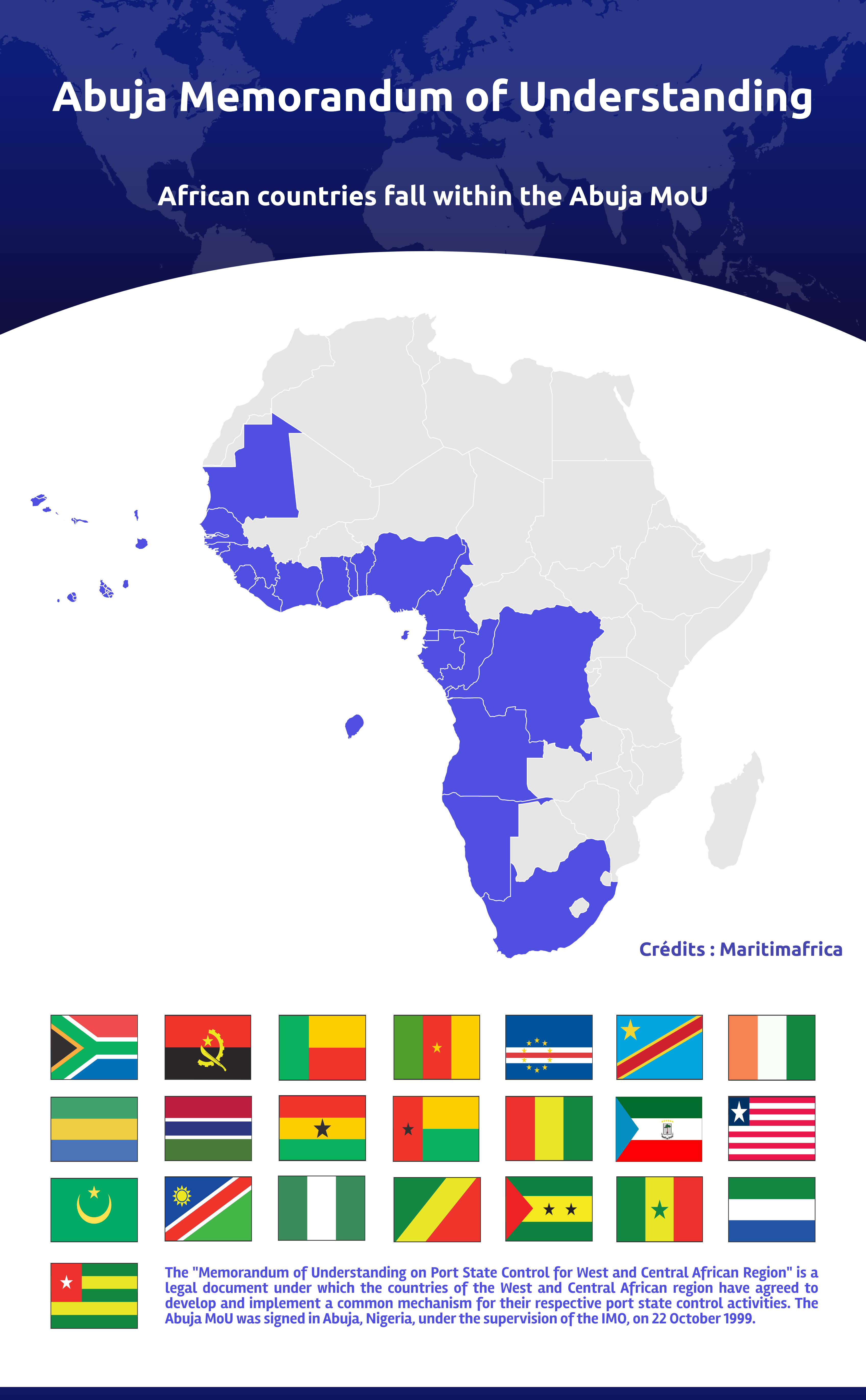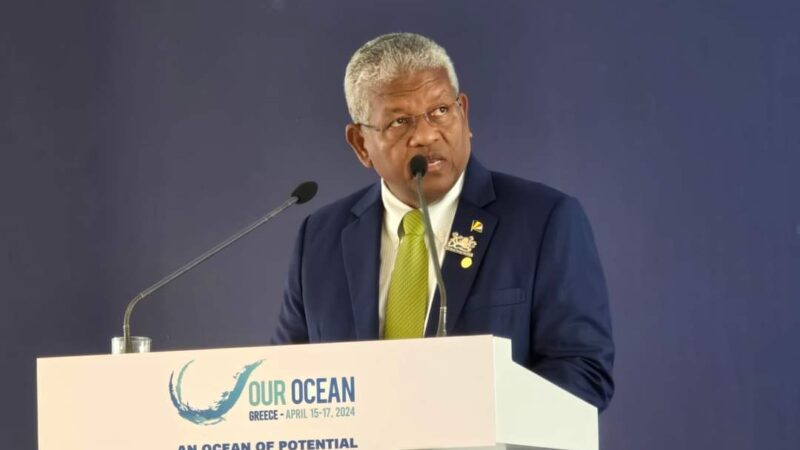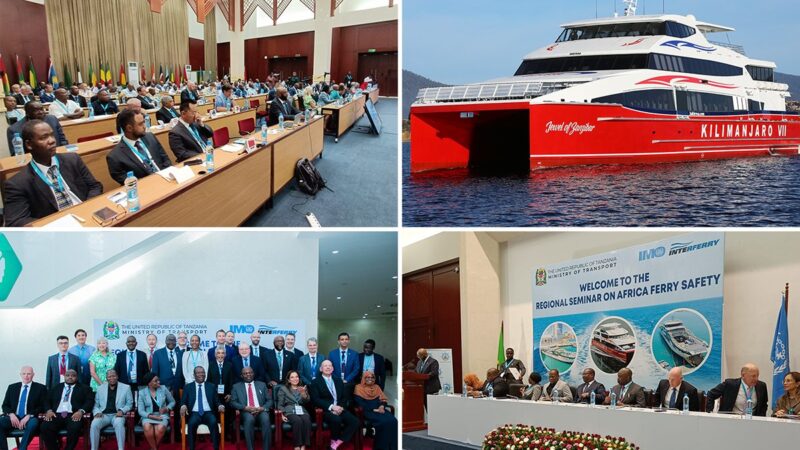The Abuja MoU
The “Memorandum of Understanding on Port State Control for West and Central African Region” commonly referred to as the “Abuja Memorandum of Understanding “, or “Abuja MoU” is a legal document under which the countries of the West and Central African region have agreed to develop and implement a common mechanism for respective port state control activities.
This is an agreement between the different maritime administrations of the West and Central Africa Region.
The Abuja Memorandum of Understanding was signed in Abuja, Nigeria, under the supervision of the International Maritime Organisation (IMO), on 22 October 1999, by sixteen (16) African States, namely: Benin, Cape Verde, Congo, Côte d’Ivoire, Gabon, Gambia, Ghana, Guinea, Liberia, Mauritania, Namibia, Nigeria, Senegal, Sierra Leone, South Africa and Togo.
The objective of the Abuja Memorandum of Understanding is to harmonise the port state control procedures and practices of all countries in the region in order to eliminate substandard shipping operations in the region and thereby ensure maritime safety and security, protection of the marine environment from pollution and improvement of the working and living conditions of ships’ crews.
The Abuja MoU includes, among the relevant instruments underpinning its port State control arrangements :
- International Convention on Load Lines, 1966 (LOAD LINES 66);
- Protocol of 1988 relating to the International Convention on Load Lines, 1966 (LL PROT 88);
- International Convention for the Safety of Life at Sea, 1974 (SOLAS);
- Protocol of 1978 relating to the International Convention for the Safety of Life at Sea, 1974 (SOLAS PROT 78);
- Protocol of 1988 relating to the International Convention for the Safety of Life at Sea, 1974 (SOLAS PROT 88);
- International Convention for the Prevention of Pollution from Ships, 1973, as modified by the Protocol of 1978 relating thereto, and as further amended by the Protocol of 1997 (MARPOL);
- International Convention on Standards of Training, Certification and Watchkeeping for Seafarers, 1978 (STCW 78), as amended;
- Convention on the International Regulations for Preventing Collisions at Sea, 1972 (COLREG 72);
- International Convention on Tonnage Measurement of Ships, 1969 (TONNAGE 69);
- International Convention on Civil Liability for Oil Pollution Damage, 1969 (CLC 1969);
- Protocol of 1992 to amend the International Convention on Civil Liability for Oil Pollution Damage, 1969 (CLC PROT 1992);
- International Convention on the Control of Harmful Anti-Fouling Systems on Ships, 2001 (AFS 2001);
- Maritime Labour Convention, 2006 (MLC 2006);
- International Convention for the Control and Management of Ships’ Ballast Water and Sediments (BWM) 2004.
- International Convention on Civil Liability for Bunker Oil Pollution Damage, 2001 (Bunker 2001).
The Abuja MoU is one of ten regional port state control regimes.
The ten regional port State control regimes
- Paris MoU: Belgium, Bulgaria, Canada, Croatia, Cyprus, Denmark, Estonia, Finland, France, Germany, Greece, Iceland, Ireland, Italy, Latvia, Lithuania, Malta, Netherlands, Norway, Poland, Portugal, Romania, Russian Federation, Slovenia, Spain, Sweden and the United Kingdom.
- Mediterranean MoU: Algeria, Cyprus, Egypt, Israel, Jordan, Lebanon, Malta, Morocco, Tunisia and Turkey
- Tokyo MoU: Australia, Canada, Chile, China, Fiji, Hong Kong, Indonesia, Japan, Malaysia, New Zealand, Panama, Papua New Guinea, Peru, Philippines, Russia, Singapore, Solomon Islands, South Korea, Thailand, Vanuatu and Vietnam.
- Indian Ocean MoU: Australia, Bangladesh, Comoros, Eritrea, France, India, Iran, Kenya, Madagascar, Maldives, Mauritius, Mozambique, Myanmar, Oman, Seychelles, South Africa, Sudan, Sri Lanka, Tanzania and Yemen.
- Acuerdo de Viña del Mar (Latin America): Argentina, Bolivia, Brazil, Chile, Colombia, Cuba, Ecuador, Honduras, Mexico, Panama, Peru, Uruguay and Venezuela.
- Caribbean MoU: Antigua and Barbuda, Aruba, Bahamas, Barbados, Belize, Bermuda, Cuba, Curaçao (formerly the Netherlands Antilles), France, Grenada, Guyana, Cayman Islands, Jamaica, Netherlands, St. Kitts and Nevis, St. Lucia, St. Maarten, St. Vincent and the Grenadines, Suriname, Trinidad and Tobago.
- Abuja MoU: Angola, Benin, Cameroon, Cape Verde, Congo, Côte d’Ivoire, Democratic Republic of Congo, Equatorial Guinea, Gabon, Gambia, Ghana, Guinea-Bissau, Guinea Conakry, Liberia, Mauritania, Namibia, Nigeria, Sao Tome and Principe, Senegal, Sierra Leone, South Africa and Togo.
- Black Sea MoU: Bulgaria, Georgia, Romania, Russia, Turkey and Ukraine.
- Riyadh MoU (the Persian Gulf): Bahrain, Kuwait, Oman, Qatar, Saudi Arabia and the United Arab Emirates.
- US Coast Guard: this is the tenth port state control regime.




